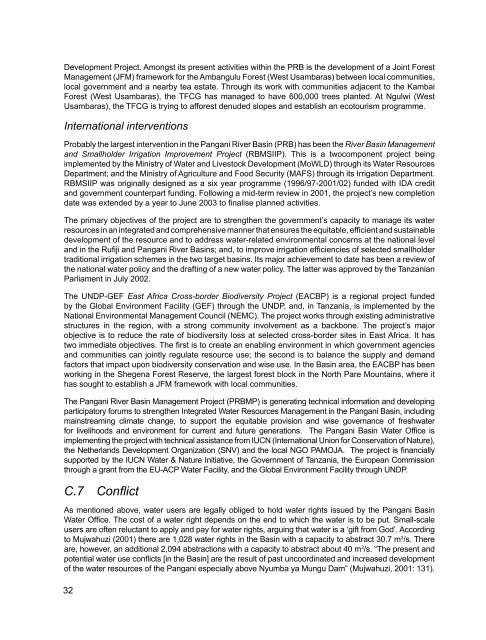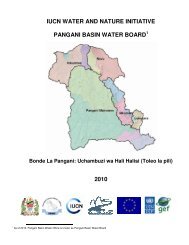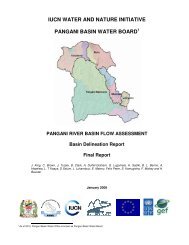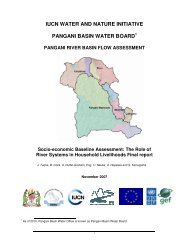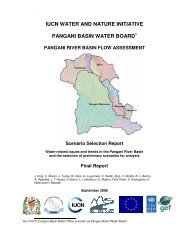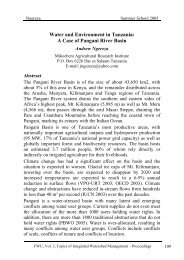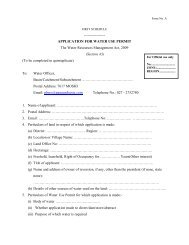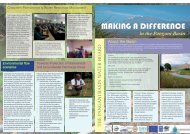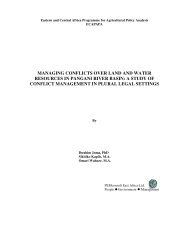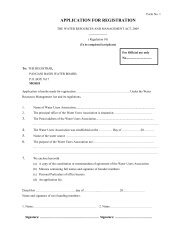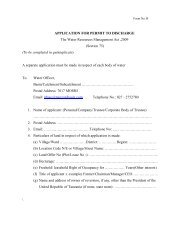PANGANI BASIN WATER BOARD
PANGANI BASIN WATER BOARD
PANGANI BASIN WATER BOARD
Create successful ePaper yourself
Turn your PDF publications into a flip-book with our unique Google optimized e-Paper software.
Development Project. Amongst its present activities within the PRB is the development of a Joint Forest<br />
Management (JFM) framework for the Ambangulu Forest (West Usambaras) between local communities,<br />
local government and a nearby tea estate. Through its work with communities adjacent to the Kambai<br />
Forest (West Usambaras), the TFCG has managed to have 600,000 trees planted. At Ngulwi (West<br />
Usambaras), the TFCG is trying to afforest denuded slopes and establish an ecotourism programme.<br />
International interventions<br />
Probably the largest intervention in the Pangani River Basin (PRB) has been the River Basin Management<br />
and Smallholder Irrigation Improvement Project (RBMSIIP). This is a twocomponent project being<br />
implemented by the Ministry of Water and Livestock Development (MoWLD) through its Water Resources<br />
Department; and the Ministry of Agriculture and Food Security (MAFS) through its Irrigation Department.<br />
RBMSIIP was originally designed as a six year programme (1996/97-2001/02) funded with IDA credit<br />
and government counterpart funding. Following a mid-term review in 2001, the project’s new completion<br />
date was extended by a year to June 2003 to finalise planned activities.<br />
The primary objectives of the project are to strengthen the government’s capacity to manage its water<br />
resources in an integrated and comprehensive manner that ensures the equitable, efficient and sustainable<br />
development of the resource and to address water-related environmental concerns at the national level<br />
and in the Rufiji and Pangani River Basins; and, to improve irrigation efficiencies of selected smallholder<br />
traditional irrigation schemes in the two target basins. Its major achievement to date has been a review of<br />
the national water policy and the drafting of a new water policy. The latter was approved by the Tanzanian<br />
Parliament in July 2002.<br />
The UNDP-GEF East Africa Cross-border Biodiversity Project (EACBP) is a regional project funded<br />
by the Global Environment Facility (GEF) through the UNDP, and, in Tanzania, is implemented by the<br />
National Environmental Management Council (NEMC). The project works through existing administrative<br />
structures in the region, with a strong community involvement as a backbone. The project’s major<br />
objective is to reduce the rate of biodiversity loss at selected cross-border sites in East Africa. It has<br />
two immediate objectives. The first is to create an enabling environment in which government agencies<br />
and communities can jointly regulate resource use; the second is to balance the supply and demand<br />
factors that impact upon biodiversity conservation and wise use. In the Basin area, the EACBP has been<br />
working in the Shegena Forest Reserve, the largest forest block in the North Pare Mountains, where it<br />
has sought to establish a JFM framework with local communities.<br />
The Pangani River Basin Management Project (PRBMP) is generating technical information and developing<br />
participatory forums to strengthen Integrated Water Resources Management in the Pangani Basin, including<br />
mainstreaming climate change, to support the equitable provision and wise governance of freshwater<br />
for livelihoods and environment for current and future generations. The Pangani Basin Water Office is<br />
implementing the project with technical assistance from IUCN (International Union for Conservation of Nature),<br />
the Netherlands Development Organization (SNV) and the local NGO PAMOJA. The project is financially<br />
supported by the IUCN Water & Nature Initiative, the Government of Tanzania, the European Commission<br />
through a grant from the EU-ACP Water Facility, and the Global Environment Facility through UNDP.<br />
C.7 Conflict<br />
As mentioned above, water users are legally obliged to hold water rights issued by the Pangani Basin<br />
Water Office. The cost of a water right depends on the end to which the water is to be put. Small-scale<br />
users are often reluctant to apply and pay for water rights, arguing that water is a ‘gift from God’. According<br />
to Mujwahuzi (2001) there are 1,028 water rights in the Basin with a capacity to abstract 30.7 m 3 /s. There<br />
are, however, an additional 2,094 abstractions with a capacity to abstract about 40 m 3 /s. “The present and<br />
potential water use conflicts [in the Basin] are the result of past uncoordinated and increased development<br />
of the water resources of the Pangani especially above Nyumba ya Mungu Dam” (Mujwahuzi, 2001: 131).<br />
32


